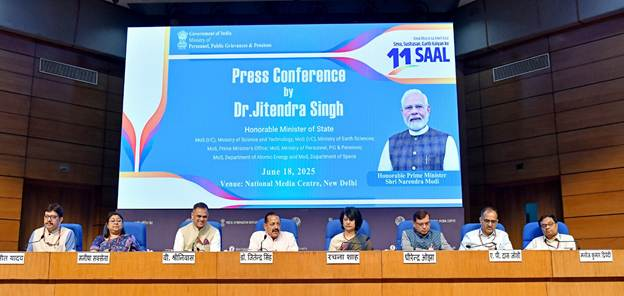Empathy, Efficiency, Empowerment: 11 Years of Reform at Ministry of Personnel
Speaking at a high-level event at the National Media Centre, New Delhi, Dr. Singh unveiled a legacy of citizen-centric reforms and administrative innovations that have defined the Modi Government’s governance ethos since 2014.

- Country:
- India
In a milestone commemoration of reform-driven governance, Union Minister Dr. Jitendra Singh, Minister of State (Independent Charge) for Science and Technology, Earth Sciences, and Minister of State for PMO, Atomic Energy, Space, Personnel, Public Grievances and Pensions, outlined the transformative 11-year journey of the Ministry of Personnel, Public Grievances and Pensions. Speaking at a high-level event at the National Media Centre, New Delhi, Dr. Singh unveiled a legacy of citizen-centric reforms and administrative innovations that have defined the Modi Government’s governance ethos since 2014.
Major Policy Breakthrough: Gratuity for NPS Employees
At the heart of the announcement was a landmark welfare decision: Central government employees under the Unified Pension Scheme (NPS) will now receive retirement and death gratuity benefits under the Central Civil Service (Payment of Gratuity under NPS) Rules, 2021. Dr. Singh described this as a long-awaited and critical parity measure that affirms the government’s commitment to social security and fairness in post-retirement benefits.
“This reform addresses the persistent concerns of a large section of government employees and reflects our resolve to provide dignity and security at the end of service,” the Minister stated.
Four Pillars of Transformation
Dr. Jitendra Singh framed the Ministry’s 11-year evolution along four foundational pillars: Legislative Simplification, Empathy-Based Policy, Innovation-Driven Governance, and Citizen Empowerment.
1. Simplification of Governance Structures
For the first time since Independence, governance reform included doing away with more than 1,600 obsolete rules, many rooted in the colonial era. These efforts sent a strong signal of administrative modernization and trust in citizens, particularly the youth.
Among the standout measures was the abolition of job interviews for non-gazetted posts, announced from the Red Fort by Prime Minister Narendra Modi and implemented nationwide by January 2016. This single step ensured a level playing field for aspirants and enhanced transparency in public recruitment.
2. Human-Centric, Empathetic Reforms
“Policy must not just regulate, but also understand,” Dr. Singh remarked as he elaborated on reforms that emerged from personal accounts of hardship faced by citizens. These included:
-
Introduction of Digital Life Certificate (Jeevan Pramaan) for pensioners
-
Provision of family pension for divorced or separated daughters
-
Granting maternity leave even in cases of stillbirth
-
Expediting over 19,000 long-pending promotions in Central Secretariat Services
-
Protection of honest officials through balanced amendments to the Prevention of Corruption Act
These steps reinforced a governance model based on empathy, dignity, and compassion.
3. Innovative, Technology-Enabled Governance
Innovation played a key role in reimagining public service delivery. Initiatives highlighted included:
-
The launch of iGOT-Karmayogi under the Mission Karmayogi framework, now onboarding over one crore government officials, fostering a culture of lifelong learning
-
Establishment of the Capacity Building Commission
-
Transformation of CPGRAMS into a world-class, multilingual grievance redressal system receiving over 26 lakh complaints annually with a 95-96% disposal rate
-
Launch of the ‘Anubhav’ platform, where retiring officers share knowledge and experiences for institutional continuity
-
Assistant Secretary Programme empowering young IAS officers with early exposure to central governance
Dr. Singh declared, “We have moved from red tape to real-time, from file-pushing to feedback-based policy.”
4. Empowerment Through Inclusion and Speed
Backing the Prime Minister’s mantra of “Minimum Government, Maximum Governance,” DoPT Secretary Ms. Rachna Shah showcased how the ministry drastically improved inclusivity, responsiveness, and efficiency. Key highlights included:
-
Fast-tracked recruitment timelines
-
Exams conducted in multiple regional languages
-
Addressing 4.5 lakh backlog vacancies in reserved categories
-
Introduction of e-HRMS, e-APAR, and virtual hearings for the Central Administrative Tribunal
-
Over 8.9 lakh tribunal cases disposed using e-tools
-
Comprehensive guidelines on maternity leave, child care, and disability reservation
She emphasized that transparency was further institutionalized through the digital RTI platform and modernised administrative systems.
Strengthening Pensions and Grievance Redressal
Secretary V. Srinivas of DARPG and DoPPW spoke on the wide impact of CPGRAMS, which now uses AI and multilingual support for grievance redressal. Citizen feedback from over 20 lakh users is actively incorporated into policy and service refinement.
The Pension Adalats initiative was another key success, with 25,000 cases resolved directly and over 4 crore pensioners empowered digitally. Simplification of pension forms and CCS Rules further improved the ease of living for retirees.
Mr. Srinivas also emphasized India’s international role in administrative reform through multiple MOUs and global knowledge exchanges in public governance.
Launch of Key Publications and Digital Tools
Marking the occasion, Dr. Jitendra Singh released:
-
11-Year Achievements Booklets of DoPT, DARPG, and DoPPW
-
Guidelines for Family Pensioners’ Grievances Campaign
-
Circular Compendium (Aug 2024 – Jun 2025)
-
New Circulars on Central Civil Services Rules
-
Sevottam Training Modules for excellence in service delivery
These publications encapsulate the vast journey of institutional reform and create a roadmap for future transformations.
A Unified Administrative Front
The event saw participation from senior officers across departments: Ms. Manisha Saxena, Shri A.P. Das Joshi, Shri Manoj Kumar Dwivedi, and Shri Puneet Yadav, reinforcing the Ministry’s integrated, mission-driven approach to reform.
In conclusion, Dr. Jitendra Singh reiterated that the Ministry’s decade-plus journey embodies a new narrative in Indian governance—one where intent is not presumed guilty, policies are people-first, and governance is defined by empathy, innovation, and inclusion.
- READ MORE ON:
- DoPT reforms
- Gratuity for NPS employees
- Mission Karmayogi
- CPGRAMS
- Pension Adalats
- Digital Governance India
- Jitendra Singh reforms
- Central Civil Services
- Administrative reforms
- Red tape removal
- iGOT Karmayogi
- Civil services innovation
- Public grievance redressal
- Transparency in governance
- Empathy-based policy India










